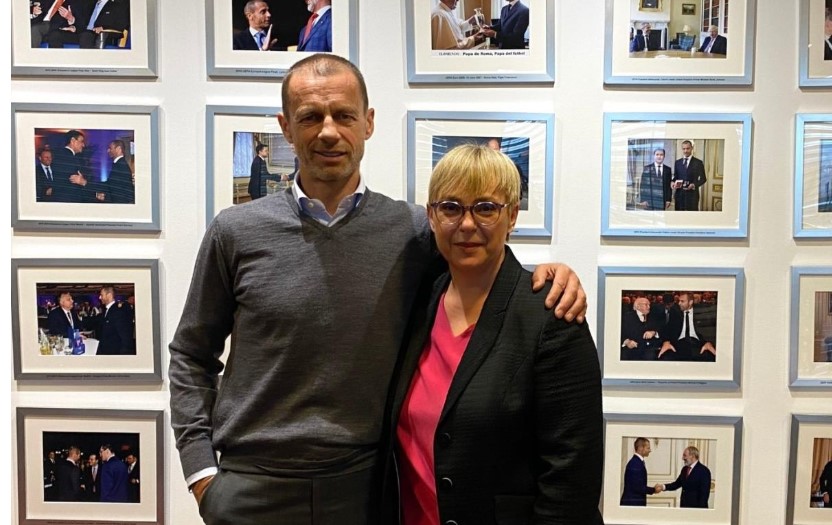By: Andrej Žitnik / Nova24tv
Aleksander Čeferin, the infamous UEFA President and son of Peter Čeferin, who was often referred to by some as “the devil’s advocate” due to his legal representation of psychopathic murderers, is known to like to hang out with politicians. Both previously, as a lawyer and the President of the Football Association of Slovenia, as well as now, when he holds the prestigious post of UEFA President. We have also seen photographs of him with both modern-day bearers of the fascist axis of evil – his namesake, Lukashenko, and Vladimir Putin.
But there is only one kind of politics that fascinates, or should we even say excites, Aleksander Čeferin so much that he wants to actively intervene in it before he has even stepped foot in it. That is, of course, Slovenia’s politics. The Čeferin clan is known in these parts as a solid part of the left-wing quasi-socialist cream of the crop, which sometimes tacitly and sometimes loudly supports the left-wing political candidates. This is understandable, of course – the legal profession thrives the most when the country is in chaos, and the socialists are the guarantors of chaos, lawlessness, kleptocracy, nepotism and the tear-down of the foundations of the rule of law.
In the past, he has repeatedly interfered directly and indirectly in Slovenian politics In the past, Čeferin has indirectly gotten himself involved in the Slovenian political scene on several occasions with some critical comments about the previous government. Of course, his every word immediately became gold, for example, in Odlazek’s media outlets and web portals – especially in the daily “Ekipa” (“Team”), where an almost neurotic attitude of uncompromising reverence for Čeferin’s every move and word was established, as well as in the biggest and richest media outlet in the country – POP TV.
During the pandemic, he often spoke about the repressive Slovenian government through domestic and foreign megaphones, but of course, no one ever asked him what he thought about the much harsher anti-Corona measures in Belgium, Germany, France, the Netherlands… He was left to play his role of a “non-political” bystander, criticising the Janša government as an ordinary citizen (just like the “ordinary” pensioner Kučan). This in itself was extremely controversial because, as an official of one of the biggest sports federations on the continent, he should not be involved in the politics of individual countries – and especially not in the politics of the country from which he himself comes.
But now he has crossed the line, even judging by his low standards, as the blogger and libertarian activist Tomaž Štih, with the nickname “Libertarec” (Libertarian), pointed out on Twitter. “The UEFA President has been completely absorbed in the politics of our country for months now,” he wrote. “Here he is pictured supporting the candidate for the President of the Republic of Slovenia. But don’t you have a rule at UEFA about the meddling [of the organisation’s leadership] in politics? In addition, he is standing in front of a wall with photos of past presidents. This is political propaganda.”
Politics does not belong in sport UEFA and all other global sports organisations (FIFA, FIA, DORNA) build their credibility on a complete dissociation from national politics. Not only that, but players and teams participating in competitions must also refrain from any political, national or religious slogans, writings or pictorial material. This attitude towards politics makes a lot of sense because, without it, any sports organisation would quickly be overtaken by the political powers of the biggest countries, which would then give preferential status to their teams. Some argue that politics is already cleverly involved in sporting events – but in a subtle way, isolated from the serious everyday political events. Everyone is currently whispering about why the State of Qatar was entrusted with the organisation of the football World Cup and why Formula One races were held in dictatorial countries, such as Russia, China, Azerbaijan and Saudi Arabia.
Will Čeferin resign? Čeferin’s photo-op with the presidential candidate Pirc Musar is a blatant politicisation of the office he represents and an exploitation of his international power to help her win against a candidate who represents a strong opponent of his and her political option. In reality, this is not only an intervention in Slovenian politics with the clear motive of promoting a far-left candidate but also an undermining of the integrity of the office of the UEFA President, who is getting involved in very specific micro-political conflicts in his own country. It is an excess that is certainly worthy of
resignation from the prestigious post, but it will be interesting to see how the incident is seen by the British media, which have so far been the only ones to report on Čeferin correctly and without fear.

